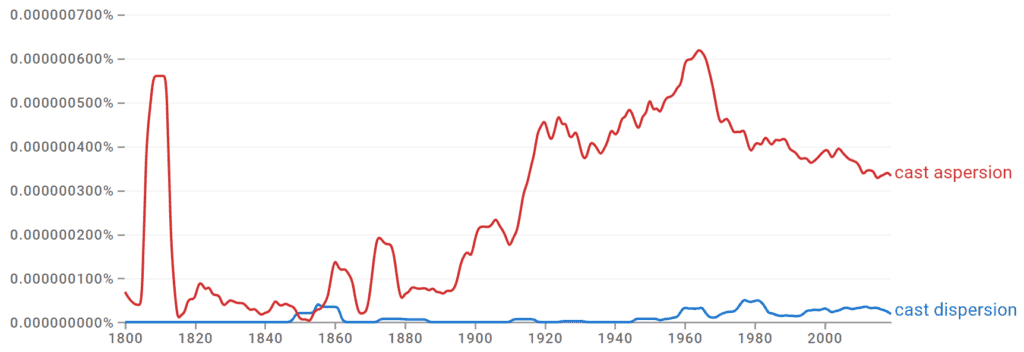The words aspersion and dispersion are a couple of hundred years old each and have strong religious roots in relation to their original usage. Over time, both integrated into the English language in a more secular manner. However, they had the unfortunate consequence of being confused with one another due to their similarity in sound and spelling.
To cast something means to throw something around, but are you casting aspersions or dispersions? Let’s explore each of their meanings in this guide so you can use each properly.
Do You Cast Aspersions or Dispersions?

Let’s cut to the chase. You cast aspersions, not dispersions.
To cast something means throwing or tossing something around, literally or figuratively. It’s a recognized action and usually infers that whatever you are casting is not private in nature.
To disperse something is the act of scattering it over a large area. Therefore, if you cast dispersions, you would be casting the scattering of something else. That makes no sense whatsoever.
Aspersions is defined as a disparaging or disrespectful remark.
So, when you cast aspersions, you are actually throwing out a disrespectful remark or disparaging charge that could harm a person’s reputation.
When somebody uses the phrase cast dispersions, they are doing so incorrectly and either misheard the correct phrase or are confused between the two words.
What Does Aspersion Mean?

An aspersion is an attack on someone’s character or integrity. The word aspersion also means to sprinkle with something, such as sprinkling water during a religious ceremony, even though this definition is almost never used in a modern context.
Today, one rarely sees the word aspersion used outside of the idiom cast aspersions.
For example:
- The political debate was hot and fierce, with each candidate casting aspersions before the first question was even asked.
- If what you are telling me is true, I will apologize for the aspersions I cast upon his essay and recalculate his score.
- I never intended to cast aspersions upon the school board, but these are issues we need to discuss and solve as a community.
Origin of Aspersion
Aspersion originated as aspercion in the mid-15th century as a theological expression to signify the “shedding of Christ’s blood.” It is derived from the Latin aspersionem, meaning “a sprinkling.” It was used figuratively when sprinkling holy water upon a congregation.
The secular use to mean “a bespattering with slander [or]…criticism” is from later in the century.
Cast aspersions is from the mid-1700s.
Henry Fielding first used the idea of casting aspersions in his book “Tom Jones,” published in 1749:
“I defy all the world to cast a just aspersion on my character… .”
What Does Dispersion Mean?

Dispersion is the act of scattering something over a wide area or the state of having been scattered over a wide area.
For example:
- In physics, dispersion is the act of separating white light into its component colors.
- The dispersion of the students into the park took less than 30 seconds, but they did have directions to meet back up at lunch to check in.
- The wind blew through the trees, and we were able to watch the dispersion of the pollen from the evergreens as it took to the air, coating everything in its path in fine, yellow dust.
Origin of Dispersion
Dispersion also originated with a religious context as dispersioun in the late 14th century to mean “the Jewish diaspora,” or a word to describe the dispersion of Israelites out of Israel into other parts of the globe. It derives from the Latin dispersionem, meaning “a scattering.”
The secular use that means to scatter or disperse something came into use in the early 15th century.
Let’s Review
Aspersion and dispersion are two words that are sometimes confused despite meaning two very different things. Originating within a religious context, they have changed through the years to offer everyday secular use.
Aspersion is defined as an attack on a person’s integrity or character, often using slander to do so. When you cast aspersions, you are scattering or throwing insults at others.
Dispersion means to scatter something across a large area. You cannot cast dispersion, and anyone who thinks so either heard cast aspersion incorrectly or they are simply mistaken in their use of the words.
Check out some other articles we covered:
